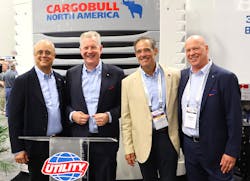Closer inspection: Cargobull leaders dish on North American plans
FORT WORTH, Texas—The new Cargobull North America (CBNA) joint venture between California-based Utility Trailer Manufacturing and European trailer maker Schmitz Cargobull will deliver integrated 3000R refrigerated trailers with CBNA transport refrigeration units (TRUs) and Utility TrailerConnect Pro telematics to North American fleets.
They plan to start producing their trailer OEM-designed TRUs in the U.S. by 2026.
“It’s a great partnership with Cargobull North America,” Jeff Bennett, Utility president and CEO, told sister publication Refrigerated Transporter during the Cargobull North America reveal Sept. 11 at the International Foodservice Distributors Association’s (IFDA) 2023 Solutions Conference. “This an opportunity where one plus one equals three. We bring over 200 years of experience together, and we can try new ideas. They’ve got great ways of doing things in Europe we might adapt here, if they’re better, and vice versa, and we can collaborate.
“It’s great to have a partner who’s just like us but isn’t a competitor.”
To learn more leaders’ plans for Cargobull North America, including its “modular” approach to manufacturing both hybrid units and future electric versions—which they say promotes more cost-efficient production and service—Trailer/Body Builders went one-on-two with Bennett and Andreas Schmitz, Cargobull CEO and chairman of the board, inside a Cargobull-equipped Utility reefer in an exclusive interview. The duo dished on the challenges of taking on well-established TRU manufacturers in a new market, synergies created by working together, and how their innovative partnership materialized.
Questions and answers are edited for length and clarity.
Refrigerated Transporter: Why did Utility and Schmitz Cargobull decide to partner up?
Jeff Bennett: “We’ve got a trailer manufacturer [Schmitz] that actually built the TRU, and all the telematics and sensors. Those are fantastic advantages for Utility to take advantage of, and piggyback on, because they’ve already done the hard work. We just have to adapt it and work together to bring it to the North American market, so it’s a good deal for Utility, and Schmitz as well, because they can produce more units. It’s a win-win.”
RT: How challenging is bringing a new TRU name into the North American market?
Andreas Schmitz: “Let’s face it, for us to even bring that into the German and European markets was tough because there are two major players there, too, who we all know, but eventually we realized they weren’t integrated well enough with the trailers. We felt we could do more if we worked more closely with them, but it didn’t happen, so we went our own way. That’s something we decided to do and we never looked back, and it was the right decision for us, because we realized we can do so much by fully integrating the TRU into the trailer, and combining it with telematics, and [Utility COO] Steve [Bennett] and Jeff saw the benefit in that, and decided, ‘Let’s bring it over here.’
“We are excited about this opportunity. It’s probably our one big chance to enter this important American market. We’re happy to do that. It gives us more volume. We are learning from Utility, they’re learning from us, and we’ve been completely open with the partnership, so it will make both of us stronger, both for a great cause [sustainability], and in the long term, allowing us to share development costs and new ideas.
“That’s something I see as very positive, and the nice thing is, we’re not competing in any markets. So it’s a perfect.”
RT: Does Schmitz Cargobull plan to sell trailers in North America as well?
AS: “No. We know what we’re capable of doing, and we know what Utility is capable of doing, and by combining like this, we’re very happy. We’re happy with bringing our cooling unit to this market, and the telematics, and sharing that.”
RT: Are there any advantages to producing TRUs as trailer manufacturers?
AS: “Yes, absolutely.”
JB: “Look at the remote evaporator. I’ve thought about having a remote evaporator that’s this low-profile for 30 years. We put these big guards around them, hoping people will bump into them first and stop before hitting the remote evaporator. But they’re still too low, so they do get hit, and they do get damaged. This one is out of the way, and if you have more clearance, you’re not going to have as much damage.
“It makes perfect sense. If you’re still worried about it, you can put a load bar across the unit for protection, but you don’t need to penalize the cargo space with an evaporator, and Schmitz realized that because it’s a trailer manufacturer.”
RT: How will the modular build approach aid the transition from diesel to electric power?
AS: “We don’t know how long this transition is going to take. It’s going to be driven by regulators and, let’s face it, the economics aren’t there, but it’s driven by regulators, so to a certain degree we will have to comply, and it makes sense to do it in a modular way, so the investment is not all lost.
“That is very important, and will help us with spare parts, training people, and making sure the service works. The modular approach is what we’ve been doing with trailers for a long time, but now we’re also doing it for cooling units.
“And, as Jeff pointed out, because we look at this with trailer eyes, we keep the customers closer than many component suppliers, and that allows us to come up with solutions that are fully integrated. The evaporator is a great example, with the reduced space, but there are so many others. The bulkhead, for example, with how you can open and clean it, and make sure the air circulation is perfect.”
RT: How did this partnership come together?
JB: “Our companies were introduced back in the 90s, so we’ve known about each other for a while. Utility had a factory in England, so we competed firsthand with Schmitz in the 90s. But then, with the Euro and other factors, we decided it would take too long to learn how to really compete in Europe. You might think you can take technology from the United States and drop it in Europe, and you’re fine. It isn’t that way at all. They have different regulations, different ways of operating, and many other factors to consider. So, when you look at a trailer made in Europe by Schmitz, you might wonder, ‘How come it’s not like one in the United States?’ But when you get into the details, you begin to appreciate why they’re designed so differently. They’re in different markets—and we weren’t in Kansas anymore back then. That’s what we learned, and now we’re wiser.”
AS: “That’s something we also realized. The markets are similar but different, and the regulations are different. Nevertheless, we can learn from each other, and take what we have learned and give it to Utility, and vice versa, and that’s why it’s a good partnership, especially on the TRUs. We’re not in competition. We’re in a joint venture.”
About the Author
Jason McDaniel
Jason McDaniel, based in the Houston TX area, has nearly 20 years of experience as a journalist. He spent 15 writing and editing for daily newspapers, including the Houston Chronicle, and began covering the commercial vehicle industry in 2018. He was named editor of Bulk Transporter and Refrigerated Transporter magazines in July 2020.

